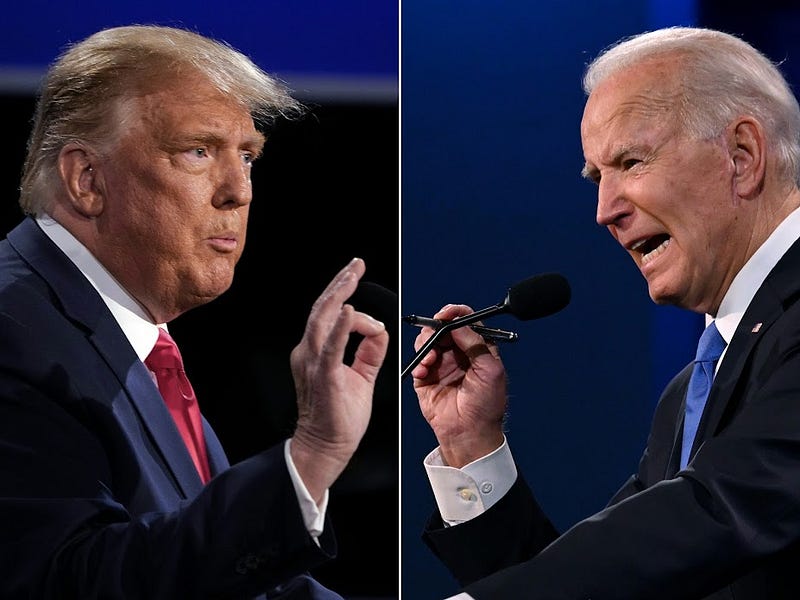The day before Election Day, Reuters ran a story about the personal toll politics has taken on some peoples’ lives.
Mayra Gomez told her 21-year-old son she’d be voting for Trump. He essentially disowned his own mother in response. Gomez says he told her: “You are no longer my mother.”
Gayle McCormick, a 77-year-old woman, left her husband because he voted for Trump.
Whenever I read or hear about such things, my first instinct is to wonder whether something more than politics is at work. Families with no other major issues tend not to do this sort of thing over politics alone.
Regardless, I think everyone can agree that politics feels more divisive than at any other point since at least the 1960s. In Divided We Fall: America’s Secession Threat and How to Restore Our Nation, my colleague David French makes a powerful case that the country could be heading toward dissolution—not so much a hot civil war as a bitter domestic cold war leading to an acrimonious divorce through secession. He’s hardly alone. With varying degrees of celebration or sorrow, various thinkers on the right and left have warned that America today looks a good deal like it did in the 1850s.
I agree with French and others that the situation is dire, even if I’m less than convinced that 1850s America is a useful guide for 2020s America.
The state we’re in is what political scientists, philosophers and psychoanalysts call “overdetermined.” Something is overdetermined when there’s more than one sufficient explanation for it.
World War I may have had a single precipitating cause—the assassination of Archduke Franz Ferdinand—but chances are the war would have happened for a slew of other reasons even if the assassin was hit by a bus before he fired the gun.
So it is with our current mess. Americans have been self-sorting for a long time. We tend to live among people who see the world the way we do, and therefore we have a difficult time understanding how anybody could see the world differently. In a Pew Research Center study, almost 80 percent of Donald Trump and Joe Biden supporters reported having few or no friends who supported the other guy.
Organized religion is receding as a binding force in our culture, and for many people, politics—in the form of nationalism or socialism or some other ism—is filling the void. Even for the religious, the animosity toward religion arouses a response that infects religion with political partisanship.
Social media tricks our brains in all sorts of unhealthy ways. Whole business models have been constructed to make money by constantly making people angry at other people.
I could go on. But some of these causes are not easily reversed, and I, for one, wouldn’t want to live in a country where the government had the power or inclination to try. We don’t want to start the forced integration of communities along ideological lines. Social media companies could certainly work harder at not being part of the problem. But again, I don’t trust the government to impose alleged “solutions” from above. I certainly think America could benefit from another religious Great Awakening, but the last thing I want to see is a government-run Office of Religious Revival.
What vexes me most about these stories of families being torn apart by partisan politics is the underlying assumption shared by both sides. It’s a worldview that elevates politics—national politics—to the primary source of meaning in people’s lives. It reminds me less of the 1850s in America than of the 1680s in England.* Catholics felt that a Protestant on the throne would overturn everything they believed about their country, and vice versa. Today, we talk about a Republican or Democrat in office as if they were monarchs with control over the nation’s soul.
I’m a conservative, so I’m enamored with smaller and more limited government anyway. But even accounting for that bias, I still think the answer is devaluing the currency of national politics. If you want stronger, more ambitious government, fine. Advocate for it at the local level, where the powers that be are more connected to the reality on the ground, and where political winners and losers have to look each other in the eye.
Alternating between parties that want to unify a vast and diverse country under “one best way” is a recipe for perpetual strife. Politics should be about solving the specific problems that government is suited to solve, not defining our souls.
Correction, November 4: This column incorrectly referred to the “1860s in England” when it should have been 1680s.
Photos by Brendan Smialowski and Jim Watson / AFP via Getty Images.







Please note that we at The Dispatch hold ourselves, our work, and our commenters to a higher standard than other places on the internet. We welcome comments that foster genuine debate or discussion—including comments critical of us or our work—but responses that include ad hominem attacks on fellow Dispatch members or are intended to stoke fear and anger may be moderated.
With your membership, you only have the ability to comment on The Morning Dispatch articles. Consider upgrading to join the conversation everywhere.